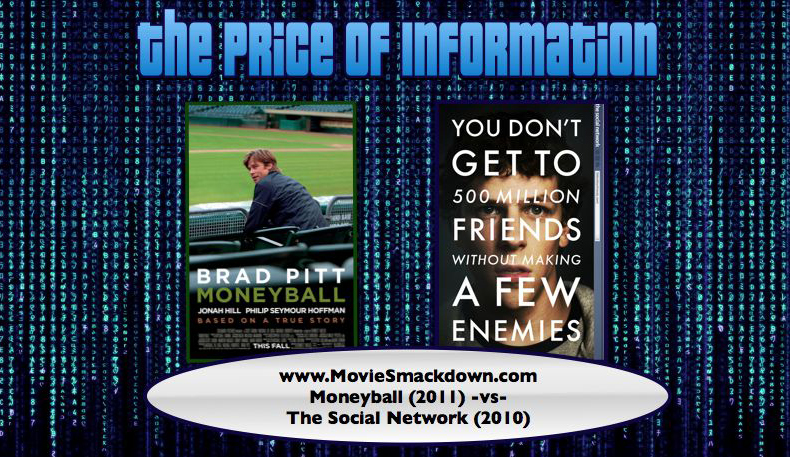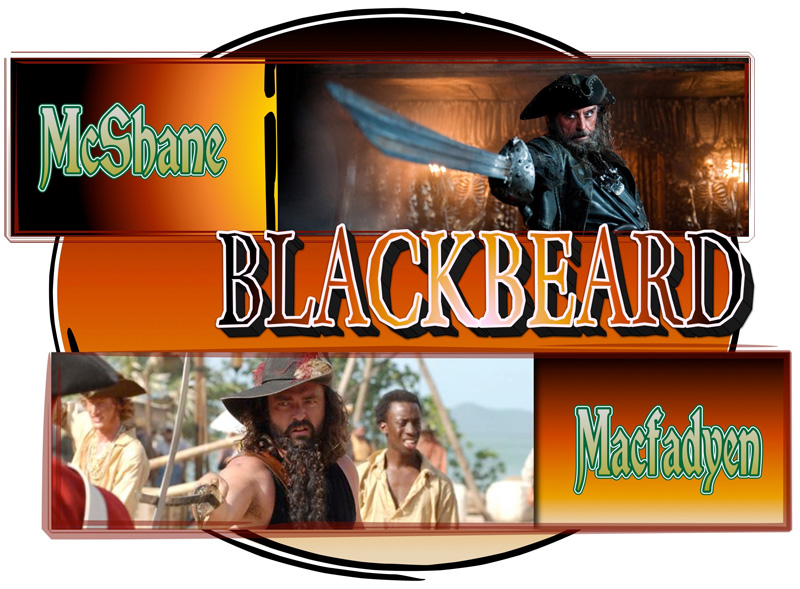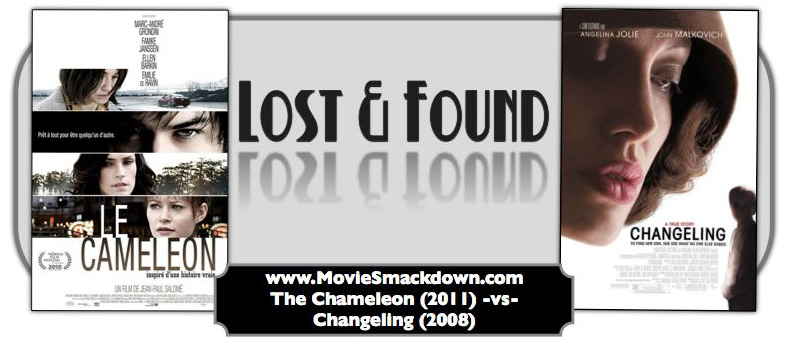
The Smackdown
Every once in a while, we have a Smackdown decided purely on brain power and wit rather than muscle. That’s the case with this edition, which pits the new baseball drama, Moneyball, against the Facebook origin saga, The Social Network. The heroes of both films, the Oakland Athletics’ intellectual general manager Billy Beane (Brad Pitt) in the former, and hyper-ambitious computer wonk Mark Zuckerberg (Jesse Eisenberg) in the latter, are portrayed as iconoclastic eggheads introducing disruptive new concepts to their respective fields.
In the case of Moneyball’s Beane, the fresh idea is “sabermetrics,†a groundbreaking new way to analyze players’ statistics to determine their suitability to staff a team, as opposed to relying on more basic stats and old-fashioned gut instinct. Zuckerberg’s landscape-shifting realization is that Internet surfers need a convenient, far-reaching online base to connect with other people they know and want to interact with. Attempting to realize their respective visions, both men run into numerous roadblocks, including but by no means limited to grouchy old coaches, recalcitrant managers, angry twins who apparently don’t understand how to solicit work under contract, and a highly offended female student body. Our protagonists, however, are whip-smart guys who quickly learn to surmount obstacles by intelligence alone. So considering that, the question is, which brainiac will be able to outfox the other to win this Smack?
[singlepic id=1241 w=320 h=240 float=right]
The Challenger
Poor Billy Beane. Charged with keeping his Oakland A’s a potential World Series contender after the 2001 season, he loses to free agency the three top players largely responsible for getting the team that far. Compounding that is his budget, or lack thereof – the club’s payroll is less than one-third that of the mighty Yankees, the team they almost defeated in the playoffs. The three players are essentially irreplaceable given the A’s lack of money. What’s a beleaguered baseball executive to do?
The answer comes in the unlikely form of Peter Brand (Jonah Hill), a pudgy computer nerd working for a rival team. Brand is an economist and statistician with a novel system that ranks each player’s appeal largely on his ability to reach base. He claims this pinpoints a number of players who are vastly undervalued based on that metric. Beane is sold on the idea and poaches Brand to be his assistant.
Their new approach to analyzing baseball data results in the hiring of forgotten and ignored players. These guys know how to get on base, however, so the team’s lineup becomes stuffed with them. Unfortunately, their shortcomings also stuff the team’s win-loss record with a great many Ls. This exasperates the veterans charged with managing and recruiting for the team, including the increasingly irate manager, Art Howe (Philip Seymour Hoffman), and the team’s pack of old-guard scouts.
Good ideas take some time to sink in and work, though, and toward the end of the season, the team has clawed its way to first place on the back of a shocking 20-game winning streak. Beane’s forgotten and unloved players are now on the brink of the postseason again and have arrived there without millionaire stars. Although the team doesn’t make it as far as the World Series (and still hasn’t, as of this writing), Beane’s approach becomes accepted and admired, to the point where he’s offered a fat contract to be GM of the Boston Red Sox. He refuses the offer but the Sox go on to win a pair of World Series using his approach. His legacy grows, and his methods win championships, even if his team doesn’t.
[singlepic id=246 w=320 h=240 float=right]
The Defending Champion
Around the time the A’s are fielding no-name players and racking up wins, a young Mark Zuckerberg is matriculating at Harvard. A cold, sub-autistic nerd (as colored by director David Fincher and star screenwriter Aaron Sorkin, from a book by Ben Mezrich), Zukerberg creates a site called Facemash one drunken night following a bitter argument with his girlfriend. The site invites users to rate the school’s coeds by degrees of attractiveness. Although this nasty move naturally angers many Harvard women, it’s nonetheless a big hit, so much so that it crashes the university’s computer system.
Impressed that Zuckerberg has managed to build a strong, popular and successful website in a matter of hours while inebriated, Crimson twins Cameron and Tyler Winklevoss (Armie Hammer and, well, just Armie Hammer) hire him to build a less offensive Internet social meeting point.
Mark isn’t the ideal collaborator; as the movie progresses he creates TheFacebook.com (as it’s first known) essentially by himself, shutting out not only the Winkelvii, as he calls the twins, but also his good friend and co-investor Eduardo Saverin (Andrew Garfield). The site is an instant hit wherever it’s rolled out – initially only at Ivy League schools, then at most American universities, then abroad, then to the rest of Earth’s population. By the end of the movie Zuckerberg’s a celebrated Internet pioneer, but at the cost of alienating nearly all of his former associates and friends. He also gets on the wrong end of a set of lawsuits. As The Social Network concludes, however, he shows a small but noticeable spark of humanity. Maybe he isn’t such a cutthroat, vindictive jerk after all.
The Scorecard
Unappreciated/misunderstood/ahead-of-their-neolithic-times innovators always make for ripe movie characters. The Social Network’s Zuckerberg is a socially challenged but enormously smart guy, seemingly always three steps ahead of even the theoretically clever Ivy League types that surround him. Billy Beane, meanwhile, is a jock with a brain, a man whose gears are always turning the right way even if he can’t articulate his ideas well or convince other people of their value. Although the history of Facebook and the (almost) fairy tale of the A’s are both good stories, essentially these are character-driven films. On that basis, The Social Network scores more points (sorry, Billy, runs). Zuckerberg’s an intriguing cypher with plots and plans locked tightly away in a very private brain. He’s a fascinating personality even when silent or delivering Sorkin’s short bursts of direct, bullet-point dialogue. We always wonder what he’s thinking and scheming, and we anticipate his next big move. (Our guess is, he’s off somewhere, secretly working on introducing an infuriating new version of this Smackdown even now.)
Beane is a more basic personality, essentially a former athlete with guts and one big idea (which isn’t, after all, really even his to begin with). His lack of eloquence and contemplative silences don’t seem to be cloaking anything too deep; he’s a one-concept guy and isn’t as fascinating as Zuckerberg, nor is he deserving of the heavy amount of screen-time he’s given. Although the film is well written (by Steven Zaillian and, again, Aaron Sorkin, from a story by Stan Chervin and the book by Michael Lewis), its direction by Bennett Miller is flat and unexceptional, adding little to spark interest. Miller’s understated directorial work benefitted the excellent Capote, but that was a story of quiet menace and ugliness bubbling under an outwardly placid surface. This approach doesn’t really fit the energetic, high-stakes professional sports world of Moneyball. Fincher’s subtle, well-balanced helming of The Social Network, on the other hand, brings out the rich dialogue and the oddball character of Zuckerberg and the flaky satellites around him (such as intense Napster founder Sean Parker, played well by Justin Timberlake). As a result, it’s a more engaging film.
The Decision
In this boxing match between two smart underdogs, it’s the non-jock who does better. The Social Network has a more interesting “hero,†who although harder to like is more compelling to watch. There are undoubtedly colorful anecdotes to be told from the A’s unexpected success, but the movie generally shies away from them in favor of a safer and more conventional presentation. At the end of the movie, for example, Beane decides not to take the Red Sox job because his budding musician daughter has recorded a rough CD asking him not to. This old Hollywood trope feels like a cheat, a convenient shortcut to address a key plot point. Filmmakers of this caliber shouldn’t have to resort to an old saw like that, considering how much potential the story has.
Despite the criticisms, Moneyball is actually an enjoyable, well made movie. But it’s a lesser film than its engaging, memorable rival. The Social Network, then, wins this Smackdown Battle of the Brains.





The Social Network is indeed the darker of the two tales with a colder hero more akin to Daniel Plainview (There Will Be Blood) than Billy Beane. Zuckerberg is portrayed as a self-destructive, shallow, Machiavellian achiever willing to sacrifice anyone who has ever offended him. By contrast, Beane seeks not vengeance but liberation from an unfair system that’s bent on holding him down.
In your review you accuse Bean of being a one-concept character without the quiet contemplative depth of the Zuckerberg portrayal. I actually see the opposite. Bean is layered as a father, GM, a haunted former player, an underdog, and as a radical outcast while Zuckerberg is a whinny jerk who just wants to get back at the cool kids.
I agree that Fincher’s subtle approach to The Social Network compliments the story and the technical aspects of the film (cinematography, score) are quite good as well. The same can be said for Miller’s directorial approach to Moneyball which deftly includes archival video and moments of voice-over from real baseball analysts. Likewise the use of score from They Will Destroy You is especially good at underscoring the film’s more dramatic moments.
Ultimately I find much more to like about Moneyball than The Social Network, not only in the story but in the performances and technical aspects of the film. Both are very good but I would re-watch Moneyball over The Social Network any day.
John, thanks for the comments, they’re insightful. Honestly, I just didn’t get much of a feeling from Beane in the movie, and also when I subsequently read the book. The traits they tried to give him (relationship with daughter, etc.), felt like throw-ins from screenwriters, not the genuine, believable traits of a fully realized character. I also didn’t find MONEYBALL as entertaining as you did; I think that somber, low energy approach did it a disservice.
Thanks for the reply Eric. I too read the book and initially found the added element of his daughter to be a bit corny and hard to swallow. But I think it works for the film and for a broader audience; who knows if Beane’s daughter didn’t play a role in his ultimate decision to stay in Oakland? Conversely I find the Zuckerberg character the more unbelievable of the two. It feels like the writers went over the top with the petty/childish stuff and in the end I found it hard to swallow.
Just got out of Moneyball. It’s a real crowd-pleaser, to be sure, but you’re right on. It’s “a lesser film than its engaging, memorable rival.”
I mean, Moneyball, while very, very good, also stripped to basics isn’t that much different than films like Remember the Titans or even Hoosiers. Maverick pulls team together to shoot for greatness. The Social Network feels like a one of a kind.
So, the Smack rightfully goes to The Social Network.